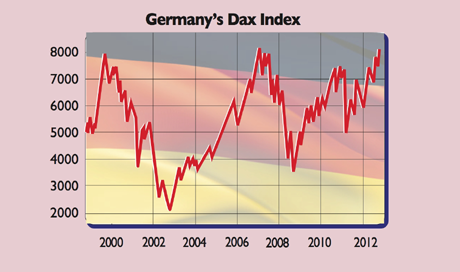
Germany’s benchmark Dax index (see chart) has surged ahead of its major European rivals over the past two years and has climbed through the 8,000 level for the third time. The last two times this happened, in 2000 and 2007, it promptly slumped. Will it have better luck this time?
Probably. Ludwig Donnert of Tao Capital, for one, sees scope for a rise to 8,700 by the end of the year. The firms that make up the Dax index are in excellent shape. In 2012, sales hit a record, while seven of the 30 firms in the index, including BMW, Henkel and Volkswagen, posted record earnings. German firms in the Dax, the midcap index MDax and the smaller TecDax are collectively paying out a record €34.4bn in dividends.
This success is not a result of a surging domestic economy, but a reflection of Germany’s reliance on exports. Germany “is torn left and right by the global cycle”, says David Milleker of Union Investment. Its economy is a geared play on the world economy. The Dax firms make around three-quarters of their sales abroad. “If the global cycle is OK, Germany is doing well. If the global cycle is bad, Germany does extremely badly.”
Right now the global economy is doing all right, even if it is hardly booming and may be cooling. The Dax’s valuation is reasonable. But all this doesn’t matter as much as it has in the past. Stefan Keitel of Credit Suisse says that “the main drivingforce” is central-bank liquidity, reinforced by a lack of investment alternatives.
The yield on German bonds is negative in inflation-adjusted terms and recent reforms make German property funds less appealing.
So while the outlook is fair for now, the Dax’s sensitivity to the global economy means that it tends to be more vulnerable than most markets when economic data or risk appetite deteriorates. A key threat is a flare-up of the euro crisis, says Thomas Harms of Ernst & Young, which “hangs over Europe’s economy like the sword of Damocles”. Dax firms are globally orientated, but they can’t completely shake off European turbulence. Most German exports still go to the eurozone.
But this shouldn’t put investors off some of the country’s blue chips, says Wirtschaftswoche. The German weekly likes insurer Allianz and chemicals group BASF. The latter, which has just raised its dividend, yields 3.5%; Allianz, 4%.